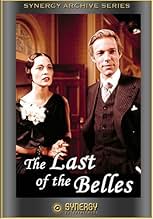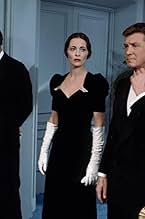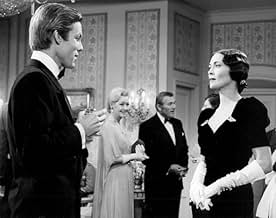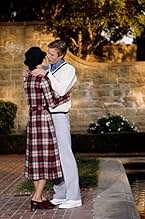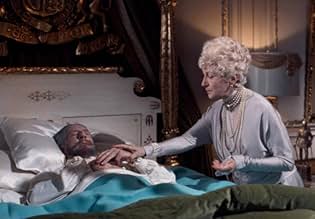The love of King Edward VIII for American divorcée Wallis Warfield Simpson eventually leads to his abdication.The love of King Edward VIII for American divorcée Wallis Warfield Simpson eventually leads to his abdication.The love of King Edward VIII for American divorcée Wallis Warfield Simpson eventually leads to his abdication.
Gerald Peters
- Benson
- (as Gerald S. Peters)
Ian Abercrombie
- English News Reporter
- (uncredited)
Joan Boston
- Mrs. Rogers
- (uncredited)
Joe Draper
- Concierge
- (uncredited)
- Director
- Writer
- All cast & crew
- Production, box office & more at IMDbPro
Featured reviews
Richard Chamberlain was happily working in England when the government refused to allow this film to be shown. Chamberlain was extremely upset and said he never would have done it had he realized the Brits would be so angered by it.
The film is a sympathetic portrait of the King, in love with a twice-divorced woman, at a time when responsibility was paramount and took precedence over private desires. His decision was bold, controversial, and badly received.
Times change, and as the years have gone on and more of the story is told, people have differing opinions.
My British friends told me that Edward was so popular, people had his photos hung in their homes. He was right up there with JFK in popularity. He was not the old man we years later saw in the press with the rather sharp-featured woman, about whom there was always plenty of gossip.
In Chamberlain we see a young man who may or may not have wanted to rule. It's possible this love story was a way out. I don't think anyone really knows, and he was perhaps not the King for England during the second world war.
One thing is clear. He spent so much time on the turmoil of his abdication that he didn't think about what he was going to do with the rest of his life, which was basically nothing.
Chamberlain and Dunaway make a far more beautiful couple than their real life counterparts. They both do an excellent job as two people in love fighting the odds.
Looking at it from a human perspective, I suppose nabbing a king and possibly becoming queen was a very attractive prospect. But who really knows what goes on between two people, or did for the next 35 years.
The film is a sympathetic portrait of the King, in love with a twice-divorced woman, at a time when responsibility was paramount and took precedence over private desires. His decision was bold, controversial, and badly received.
Times change, and as the years have gone on and more of the story is told, people have differing opinions.
My British friends told me that Edward was so popular, people had his photos hung in their homes. He was right up there with JFK in popularity. He was not the old man we years later saw in the press with the rather sharp-featured woman, about whom there was always plenty of gossip.
In Chamberlain we see a young man who may or may not have wanted to rule. It's possible this love story was a way out. I don't think anyone really knows, and he was perhaps not the King for England during the second world war.
One thing is clear. He spent so much time on the turmoil of his abdication that he didn't think about what he was going to do with the rest of his life, which was basically nothing.
Chamberlain and Dunaway make a far more beautiful couple than their real life counterparts. They both do an excellent job as two people in love fighting the odds.
Looking at it from a human perspective, I suppose nabbing a king and possibly becoming queen was a very attractive prospect. But who really knows what goes on between two people, or did for the next 35 years.
The Woman I Love was one of the most controversial films ever made. The Royals hated it, and banned it from being shown in England. When the movie became sought after in The United States, the film was quickly banned from being sold anywhere. Thus, this magnificent true story seemed to disappear from the face of the earth entirely, only to surface nearly a half century later, greatly deteriorated....but deliciously received with exceptional fervor and joy. King Edward VIII was played magnificently by Richard Chamberlain. The make-up artists were brilliant. Richard Chamberlain with his own gorgeous baby face, and the right touches of make-up, truly resembled the handsome King. The royals, who had loved Richard as Dr. Kildare in the early sixties, were greatly disturbed that he would consent to play this controversial role. Their fury made a lasting impression on the tender-hearted actor, who had lived amongst them with such happiness. The charming actor was known to be an intense people pleaser. Thus, he took an instant dislike to this movie, and expressed extreme sorrow for his role in causing the royals, as well as Edward such distress. He claimed he did not know they opposed this movie, or he would never had done it. He also took a very hard nosed attitude toward his acting ability as a result of the controversy. Too bad, because he was dead "wrong." The actor was magnificent in his portrayal of this troubled and rebellious heir to the British throne. He was brilliant as the somber, distressed, and conflicted King, carefully contemplating his abdication of the throne. Richard could hardly have gone wrong. The royals are not particularly a passionate lot, and Edward's somber moods, and bland personality was easily captured by an actor who has portrayed the gamut of emotions in far more passionate and conflicted roles than this. His portrayal was so real, and convincing, you easily forgot this was a movie, and believed yourself, alone in a room, observing the actual King as he overtly displayed his repertoire of emotions.
Faye Dunaway was a most lovely and convincing Wallis Simpson. Richard and Faye starred together in many of his early films, and had wonderful on-screen chemistry, but were most magical together in this dynamic story. It was easy to forgive the handsome and soul-searching King, as characterized by the great Richard Chamberlain. His portrait was kind to the abdicating royal. Edward, was unhappy as a privileged member of the monarchy. He had always wanted to be "like everyone else." His heart was far from his birthright of responsibilities. He hated the pompous ceremonies, costumes, and rituals that accompanied his role as King. He was distraught with the heavy "burden" imposed on him by his order of birth. His innate rebellious heart had been searching for a way out....long before it found love with the commoner Wallis Simpson.
Unfortunately a very enjoyable and well-acted movie has been withheld from the world over differences of opinion between a very honest man, his royal family,and it's subjects. I came out of this with a profound admiration for Edward VIII, as a man who courageously recognized that for himself, it was impossible to carry out the heavy burden of responsibility, and to discharge his duties as King without the help and support of The Woman He Loved. Instead of living a lie, and seething with unhappiness and contempt for his lot in life, he took action, and stayed true to himself, thus changing his life and history in one major step of courage and conviction.
Faye Dunaway was a most lovely and convincing Wallis Simpson. Richard and Faye starred together in many of his early films, and had wonderful on-screen chemistry, but were most magical together in this dynamic story. It was easy to forgive the handsome and soul-searching King, as characterized by the great Richard Chamberlain. His portrait was kind to the abdicating royal. Edward, was unhappy as a privileged member of the monarchy. He had always wanted to be "like everyone else." His heart was far from his birthright of responsibilities. He hated the pompous ceremonies, costumes, and rituals that accompanied his role as King. He was distraught with the heavy "burden" imposed on him by his order of birth. His innate rebellious heart had been searching for a way out....long before it found love with the commoner Wallis Simpson.
Unfortunately a very enjoyable and well-acted movie has been withheld from the world over differences of opinion between a very honest man, his royal family,and it's subjects. I came out of this with a profound admiration for Edward VIII, as a man who courageously recognized that for himself, it was impossible to carry out the heavy burden of responsibility, and to discharge his duties as King without the help and support of The Woman He Loved. Instead of living a lie, and seething with unhappiness and contempt for his lot in life, he took action, and stayed true to himself, thus changing his life and history in one major step of courage and conviction.
Did you know
- TriviaEileen Herlie, who stars as Queen Mary, repeated her role in the 1973 Broadway play "Crown Matrimonial", another dramatization of the same story. "Crown Matrimonial" was presented on the "Hallmark Hall of Fame" in 1974 with Greer Garson as Queen Mary.
Details
- Release date
- Country of origin
- Language
- Also known as
- La Femme que J'aime
- Filming locations
- Production companies
- See more company credits at IMDbPro
- Runtime1 hour
- Sound mix
- Aspect ratio
- 1.33 : 1
Contribute to this page
Suggest an edit or add missing content



